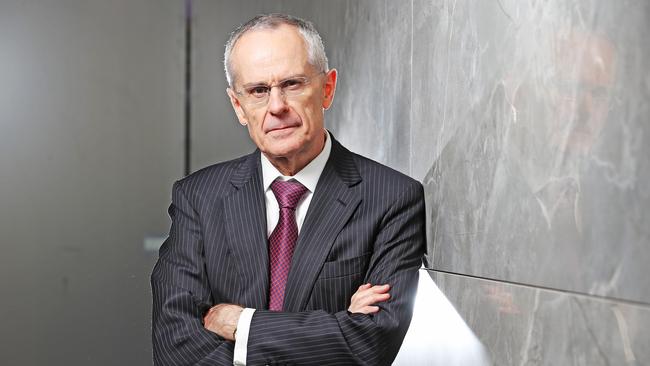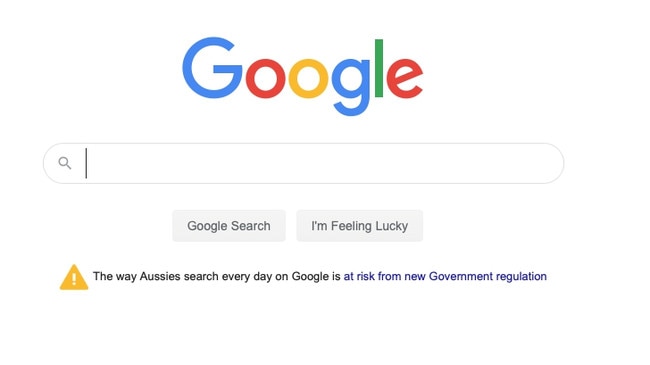Google sends open letter to Aussies, threatening to change ‘free services’ due to news code
Google says everything from its ‘free services’ to its search results could change because of a ruling that it should pay for news it uses.
Technology
Don't miss out on the headlines from Technology. Followed categories will be added to My News.
Tech giant Google has unleashed a “scare campaign” on millions of its Australian users today, sensationally claiming free services, search results, and users’ income and personal data could be put at risk if it is made to pay for the news it uses.
In an “open letter,” the trillion-dollar tech firm warned internet and video search results would be made “dramatically worse” by the Australian Competition and Consumer Commission’s news bargaining code, announced two weeks ago, and claimed “the way Aussies search every day on Google is at risk”.
But ACCC chairman Rod Sims hit back at what he called “misinformation” about the news code of conduct, and said Google would “not be required to charge Australians for the use of its free services... unless it chooses to do so”.
Critics also slammed Google’s new campaign as “balderdash” and called it a desperate attempt to avoid paying news companies for their content in Australia or overseas.
Both Google and Facebook face changes as part of the ACCC’s news bargaining code, which followed an 18-month investigation into digital platforms in Australia and their impact on journalism and advertising.
But Google Australia slammed proposed changes today, with managing director Mel Silva claiming a mandatory news code would be “unfair” and would change the way it delivered services.

Ms Silva said it would mean Google could “no longer guarantee” accurate search results, that news organisations could “artificially inflate their ranking” online, and that Google services could change.
She said the law could allow “big media companies” to “make enormous and unreasonable demands that would put our free services at risk”.
“We’re going to do everything we possibly can to get this proposal changed so we can protect how search and YouTube work for you in Australia and continue to build constructive partnerships with news media businesses; not choose one over the other,” she wrote.
Google’s Australian arm collected $4.8 billion in revenue last year, including $4.3 billion from digital advertising.
The company shared its open letter against the changes on its Australian search page today, and sent a message to YouTube creators claiming the ACCC’s news code could “mean you could receive fewer views and earn less”.
The ACCC’s news code, unveiled on July 31, recommended tech giants share revenue obtained “directly or indirectly” from news content used on their sites, in a move Federal Treasurer Josh Frydenberg said would create a “level-playing field” for Australian media businesses forced to work them.
In addition to compensating companies, the code would ask digital platforms to warn news companies about major changes to the way their content was shown, and share information about how news was used on their platforms, such as how long readers spent on each article.
Mr Frydenberg responded to Google’s claims by saying “the Government remains committed to introducing this significant reform with a world-leading mandatory code.”
And Mr Sims said Google’s open letter contained “misinformation about the draft news media bargaining code” that could give users the wrong impression about its aims.
“Google will not be required to charge Australians for the use of its free services such as Google Search and YouTube unless it chooses to do so,” he said.
“Google will not be required to share any additional user data with Australian news businesses unless it chooses to do so.
“The draft code will allow Australian news businesses to negotiate for fair payment for their journalists’ work that is included on Google services. This will address a significant bargaining power imbalance between Australian news media businesses and Google and Facebook.”
Negotiations and mediation between Google, Facebook and news organisations are due to be settled within three months.
Swinburne University social media senior lecturer Dr Belinda Barnet said Google’s new messages were an obvious “scare campaign” and many of its claims were “balderdash”.
“I can’t believe they’re trying this,” she said. “It’s like, ‘we can’t convince the Government so we’re going to try to scare users’. And they could potentially worry users but there’s a huge distrust of Google in this country.”
Dr Barnet said there was no reason the ACCC’s news code would affect Google’s search results or put users’ data at risk, and its new campaign appeared to be a “last-ditch attempt” to avoid a precedent that could see it pay for news worldwide.
“It looks like they’re going to fight,” she said. “The ACCC is digging its heels in so now they’re appealing to Google users. This seems like quite a desperate attempt to scare users and try to make them pressure the Government.”

Q&A: AUSSIE NEWS AND THE TECH GIANTS
Why does the ACCC say tech giants should pay for the news they use?
In a comprehensive, 18-month probe into digital platforms, Australia’s competition watchdog found Facebook and Google were “benefiting from a significant imbalance in bargaining power in their commercial negotiations with Australian news media businesses”.
Both companies had become “unavoidable trading partners” for Australian media organisations but did not share the revenue generated from using content created and funded by the publishers.
Why is the Australian Government taking this action?
The ACCC said that “news provides broad benefits to society beyond those individuals who consume it, but Australian news businesses risked being “undermined” by unfair commercial arrangements with online platforms and could be forced out of business.
Many Australian media outlets have already been forced to close during 2020, including 10Daily, BuzzFeed Australia, eight magazines from Bauer Media, and 36 regional and community News Corp newspapers.
Who will pay for using news under this scheme?
The Digital Platforms Inquiry named Facebook and Google as the companies to pay for Australian news content, though said the scheme could be extended to other digital platforms in future as “digital platform and news media industries continue to evolve”.
How many people see news stories from Australian publishers on Facebook and Google?
The ACCC found 32 per cent of readers visited Australian news websites through Google, and 18 per cent visited via Facebook in the 2017-2018 financial year.
Google’s influence was more pronounced for print and online outlets (34 per cent), while Facebook played a bigger role for TV and radio broadcasters (20 and 55 per cent respectively).
What Australian news organisations could be paid for their work under this bargaining code?
The ACCC has included a broad range of businesses in the code, including print, online-only, TV and radio outlets.
This will include both commercial organisations such as Nine Entertainment, Seven West Media, and News Corp which could receive funds from Google. Government-funded organisations ABC and SBS will benefit from other parts of the scheme, including more information about algorithm changes.
How much will the tech firms pay?
Negotiations will take place over the coming weeks, with negotiations closing on August 28. Laws to support the new code are due within “months”.
Do tech giants pay for news in other countries?
Not often.
Facebook has ardently rejected calls to pay for news stories published on its platform, though last year revealed plans to introduce a “news” tab to its service. It promised to pay about 200 US publishers for content under the scheme, which has yet to launch.
Google last month announced it was negotiating with a small group of publishers in Australia, Brazil and Germany to pay for premium news content. The move, one month before the ACCC’s announcement, was criticised as a way to avoid new laws.
In April, France’s competition watchdog ordered Google to negotiate with local publishers on ways to pay for their content.
And, in 2014, the Spanish government changed copyright laws to force Google to pay for the snippets of stories published on its platform. Google responded by removing Spanish outlets from its news sites worldwide.
What else would the news bargaining code do?
The ACCC says tech giants should also prioritise original news content on their platforms to reward publishers and ensure users have access to accurate information, give Australian news organisations advance notice of “significant algorithm changes” affecting their content, and provide some information about users who access their content.
Originally published as Google sends open letter to Aussies, threatening to change ‘free services’ due to news code



